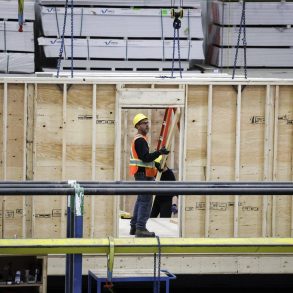Despite slowing price gains in Vancouver and a moderation in Toronto, average home prices are still notoriously expensive.
So how are these prices affecting the lives of residents in these two cities? Thanks to a new comprehensive survey released this week, we finally have some answers:
High Home Prices Taking Toll
A new survey from polling firm Angus Reid on Canada’s two hottest housing markets reveals that even homeowners in those cities are finding prices unreasonably high and want to see them come down.
A full 20% of Vancouver homeowners are hoping for prices to fall significantly (by 30% or more), while another 29% would like to see prices fall slightly (by around 10%). Similarly in Toronto, 27% want to see prices fall significantly, with another 25% hoping for a decline of 10%.
Housing affordability was ranked by residents in both cities as the most pressing issue facing the regions (54% in Toronto and 65% in Vancouver), surpassing transportation/traffic, homelessness/poverty, environmental issues and the economy.
The survey also included a “Pain Index,” which measures scores related to housing and transportation. The results showed 27% of Toronto respondents and 22% of Vancouver respondents classify their housing pain level as “miserable” (up from 17% and 18%, respectively, in 2015).
“It is a progression of pain for both regions, where Vancouver really seems to be settling in, resigned to living with this chronic pain,” Angus Reid Executive Director Shachi Kurl told the CBC. “The people of Greater Toronto are certainly more alive to it than they were three years ago.”
Full reports on both markets are available here: Vancouver survey results, Toronto survey results
BoC Rate Hike Unlikely Until at Least October
Bank of Canada Governor Stephen Poloz has made clear his desire to stay ahead of rising inflation with gradually higher rates, but NAFTA uncertainty is likely to keep the central bank on hold until at least October, according to at least one economist.
In a speech delivered over the weekend, Poloz said a gradual increase in interest rates “does not mean keeping interest rates unchanged until inflation pressures emerge. That would virtually guarantee falling behind the inflation curve.”
But most bets are off for an increase at the central bank’s September 5 meeting. Markets are pricing in just a 16% chance of a September rate hike, with uncertainty surrounding the ongoing NAFTA negotiations currently making headlines.
“Even if NAFTA negotiations are concluded successfully this week, the Bank of Canada is likely to wait until October before it raises interest rates,” Capital Economics senior Canada economist Stephen Brown wrote in a research note.”Even if a deal is reached soon, uncertainty will hang over the economy until it is actually passed into law, which will not be until at least December.”
Home Sales Data to Go Public by October 22
The Toronto Real Estate Board’s 50,000+ members will be able to publish the selling prices of properties on their password-protected websites by October 22.
The move follows the Supreme Court’s dismissal of an appeal from the country’s largest real estate board, which sought to prevent its members from posting home sales data online. TREB argued that posting the data online would breach consumer privacy and copyright.
The data release is expected to spread to most real estate markets in Canada, as many were waiting on the result of the TREB case.
Some experts believe the next push will be for the data to be available without password protection. Consumers can currently access home sale prices through real estate agents or brokers, or through property value services such as Teranet and local land registry offices, which charge a fee for access.








Really be nice if the media stopped quoting real estate board prices such as Vancouver’s “Benchmark price” as if they’re factual and legitimate. They are a figment of the board’s imagination which they conjure from thin air in order to deceive the public into believing prices are not falling, when they are.
By now, the public is catching onto this tactic, and so the media is lagging public sentiment by quoting these numbers as fact. The real fact is, Vancouver home prices are down at least 20%. 2 million today will get you 20% or more than 2 million would buy you in 2017. That is a fact, and it would be nice if we got some real reporting for a change.
We will know the actual prices when the real estate market will be forced to hand over the prices the house sold for in October. It’s about time the media stopped lying to us…..they cannot over sell us anymore. Finally a small victory from the people.